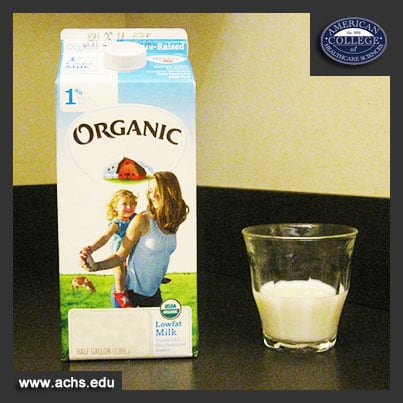Got Omega-3s? If you’re drinking organic milk, the answer is YES—according to a new study in Plos One journal. When I need a dairy fix, I only drink certified organic milk, so this new research immediately caught my attention! I first heard about the study while listening to Melissa Block’s All Things Considered segment on NPR: Study: Organic Milk Contains More Healthy Fatty Acids. Block interviews Allison Aubrey (NPR’s food and health correspondent), who offers a very digestible overview of the study’s findings. “The researchers compared organic and conventional milk head-to-head,” Aubrey says, “And they found that organic milk had about 62 percent more of heart health omega-3s, compared to conventional milk.”[1]
You may be saying: Okay, but organic milk is expensive! Why are omega-3s so important? Omega-3 and omega-6 are essential fatty acids—extremely important for maintaining healthy body function. Specifically, they support cardiovascular and mental function. In 2000, the FDA announced a health claim that supported a connection between dietary supplements containing EPA and DHA omega-3 fatty acids and the reduced risk of coronary heart disease (CHD).[2]
Heart disease is just the beginning. The omega-6 and omega-3 fatty acid combo is a rockstar for health: a healthy ratio has been shown to lower cholesterol, support healthy growth development, and promote healthy mucous membranes and skin. Essential fatty acids have also been shown to have a significant effect on emotional health—specifically problems like depression and ADHD. One study conducted in Durham schools showed increased attention span in students receiving essential fatty acid supplementation.[3] Fatty acids are extremely important in maintaining overall holistic health.
It’s important to point out that you need a balanced ratio of both omega-6 and omega-3 fatty acids for optimal health. Western diets are high in omega-6’s—and as the Plos One study points out—most people do not get enough omega-3s[4]. This leaves the body deficient and susceptible to illness. In light of this study, organic milk can help balance the fatty acid ratio in our holistic diets.
This is an extremely significant nutritional study—definitively showing that the health benefits of buying organic food products are worth the extra cost. Along with omega-3s, the researchers also found that organic milk is generally higher in antioxidants than conventional milk.[5] Antioxidants remove cancer causing free radicals from our systems, potentially saving our healthy cells from turning into cancer cells. Fighting free radicals: one more benefit on a long list of benefits to buying organic!
So why exactly is organic milk higher in omega-3s and antioxidants? As Allison Aubrey eloquently puts it: “It really comes down to what the cows were eating. Organic milk is produced from cows that spend a lot more time out on pasture […] munching on grasses and legumes, […] rich in omega-3 fatty acids. So as a result, the milk they produce has more omega-3 fatty acids.”[6] Cows that are raised and graze on organic farms typically have more room to roam, and they’re rarely fed corn (not very high in omega-3s) like conventional farm cows. This is also why pastured organic eggs are higher in omega-3s.
When we hear “omega-3s,” we often think fish oil, but greens (or algae in the case of fish) are the primary source of omega-3s in the food chain. You’ll often hear organic farmers like Joel Salatin say they’re grass farmers first and foremost! I’m toying with the idea of getting a dairy cow in 2014 (I’ll blog more about that soon!), but in the meantime, my holiday whipping cream will definitely be certified organic!
It’s very encouraging to see the organic farming industry gaining recognition for the products they produce. There is a measurable difference between industrial food products and organic, and I’m glad to see the truth begin to pervade our food culture. This year, why not add “eat and drink more organic food products” to your New Year’s resolution list, and make 2014 the Year of Organic! Either way, leave a comment with your resolutions for holistic health!
The holistic nutrition industry is growing! Learn more about ACHS’ accredited online programs in holistic nutrition by clicking the button below (and get some cool free stuff, too)!
This article is for informational purposes only. It is not intended to treat, diagnose, cure, or prevent disease. This article has not been reviewed by the FDA. Always consult with your primary care physician or naturopathic doctor before making any significant changes to your health and wellness routine.
References
[1] Aubrey, A. and Block, M. Study: Organic Milk Contains More Healthy Fatty Acids. NPR. Washington, D.C.: National Public Radio. http://www.npr.org/templates/story/story.php?storyId=250012684
[2] FDA news September 8, 2004 accessed at http://www.fda.gov/siteindex/ucm108351.htm on 12/20/2013
[3] A.J. Richardson and P. Montgomery. The Oxford-Durham Study: A randomized controlled trial of dietary supplementation with fatty acids in children with developmental coordination disorder. Pediatrics: Official Journal of the American Academy of Pediatrics, 115, 1360-1366.
[4]Benbrook, C.M., Butler, G., Latif, M.A., C. Leifert, and D.R. Davis. Organic production enhances milk nutritional quality by shifting fatty acid composition: a United States–wide, 18 month study. Plos One. doi:10.1371/journal.pone.0082429.
[5]Ibid.
[6] Aubrey, A. and Block, M. Study: Organic Milk Contains More Healthy Fatty Acids. NPR. Washington, D.C.: National Public Radio. http://www.npr.org/templates/story/story.php?storyId=250012684




